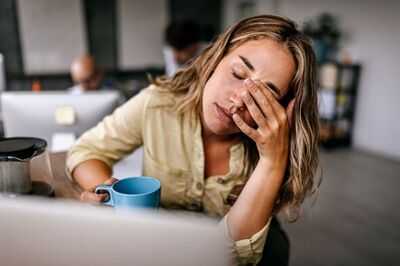Modern day life can be tiring at the best of times, but for those experiencing excessive daytime sleepiness, tiredness can be debilitating. Up to 1 in every 25000 people suffer from a rare health disorder - and experience 'issues with awakening and transitioning from sleep to awake, known as sleep drunkenness'.
The devastating condition leaves sufferers feeling extremely tired all of the time, with one person describing (on Reddit) that it 'constantly feels like you haven't slept for three days straight, no matter how much you sleep'. They reported symptoms such as 'it feels like you're drunk, you can barely talk, think or walk and you have the unresistable urge to go back to sleep'. If that wasn't bad enough, people with the chronic condition describe 'hallucinations when falling asleep and waking up, sleep paralysis, brain fog, trouble concentrating' along with feeling irritable.
Idiopathic Hypersomnia (IH) is a rare central nervous system disorder, reports Hypersomnolence UK - an organisation that helps assist those living with the health condition.
Hypersomnolence UK described the condition on their website as 'excessive daytime sleepiness despite sufficient night-time sleep'.
The organisation added: "Patients with Idiopathic Hypersomnia (IH) have a reduced quality of life. The illness puts pressure on all aspects of a patient's life.
"Patients are also unlikely to meet another sufferer by chance due to its rarity. This makes for a very isolating illness.
"It manifests as a problem with needing too much and inopportune sleep, along with other issues including daytime sleepiness, which can appear like a loss of alertness rather than sleepiness."
The NHS described the disorder as 'when someone sleeps for long periods and wakes up feeling confused or irritable and not refreshed'.
Excessive daytime sleepiness (hypersomnia) is different from feeling tired all the time, the NHS reports, they say if you have hypersomnia, you may: 'regularly nap during the day, fall asleep during the day, but still sleep for long hours at night'.
The NHS recommend you see a GP if 'you often fall asleep during the day' and / or 'sleepiness is affecting your life'.
Hypersomnolence UK went into detail on symptoms of the condition reporting that 'chronic excessive daytime sleepiness which may manifest at any time makes it difficult to perform normal daily events, including both work and social activities'
The organisation described how those with the disorder 'never truly feel awake' also described as a 'loss of alertness'.

On their website, Hypersomnolence UK said some potential symptoms are: "Unfragmented sleep for 10 hours or more over a 24-hour period. Patients often report much more, though this may be less in older people.
"Long daytime napping, similar in form to the night time sleep. This is often an unplanned event. This might be throughout the day or episodic.
"Unrefreshing night and daytime sleep. The sufferer wakes up feeling as tired as when they went to bed. (This differs from Narcolepsy where naps are refreshing).
"A problem awakening even with loud alarms, or when being physically awoken. Sleep "drunkenness" upon waking. This is an inability to swiftly transition from sleep to wakefulness - and patients also report being short-tempered in this sleep drunkenness phase."
Experiencing brain fog and / or problems with memory, attention and concentration were also detailed as potential symptoms by the organisation - and those with the condition have also reported sleep paralysis or hallucinations when falling asleep or waking up.
You may also like

'I own the UK's most haunted doll - he's made my life a living hell'

Odisha braces for Cyclone 'Montha': Eight districts on Red Zone list

Mann ki Baat: PM Modi extends greetings on Chhath puja, lauds Ambikapur's 'garbage cafe'

Uttarakhand CM Dhami attends closing ceremony of Devbhoomi Cultural Festival, says event to give boost to bond between Army and public

Arsenal's next five fixtures compared to Liverpool and Man City after Crystal Palace win






